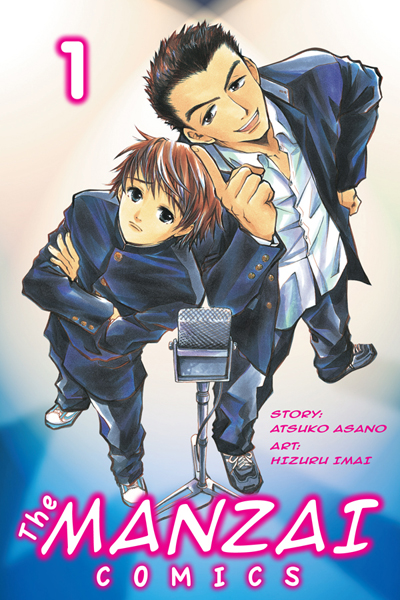 The Manzai Comics, vol. 1
The Manzai Comics, vol. 1
Story by Atsuko Asano
Art by Hizuru Imai
Rated T, for ages 13+
Aurora, $10.95
Manzai is a type of standup comedy, popular in Japan, that features a straight man and a goofy guy who misunderstands everything the straight man says. It’s a shame that the Aurora folks didn’t think to put in a translator’s note to that effect, because while I figured out pretty quickly that manzai was some sort of a comedy routine, I didn’t really get the whole concept until I looked it up.
The Manzai Comics is a curious mishmash of broad comedy routines and high-school drama. The story opens with an example of manzai, when Takashi, a high school student, asks Ayumu, the new kid in school, to “go out” with him. “Do it with me!” he pleads. Naturally, Ayumu thinks he’s being asked out on a date, when in fact Takashi is asking him to be his comedy partner.
If you think that’s hilarious, well, this is the book for you, as the real-life misunderstandings and the manzai routines blend into one another. I didn’t find any of it side-splitting, myself; perhaps manzai is an acquired taste.
But there’s more to The Manzai Comics than comedy. It’s really yet another story about fitting in and being accepted, with some interesting twists on the standard storyline. Ayumu is anxious to the point where he has trouble attending school, and he spends a lot of time worrying about being normal. Takashi, on the other hand, thinks Ayumu’s quirks make for good comedy material. Upping the angst level is the fact that Ayumu’s father and sister were killed in a car accident after quarreling with his mother over his inability to be “normal.” Naturally, Ayumu blames himself, and his mother is a nervous wreck. Other characters turn out to have serious family and romantic issues as well.
The Manzai Comics doesn’t shy away from cliché. The basic storyline revolves around the class play, part of the student culture festival, and Ayumu’s class decides to do a manzai version of Romeo and Juliet in which—wait for it—Ayumu is compelled to dress as Juliet. Still, the story works pretty well, mainly because of its dynamic cast of side characters: Takashi’s mother, who runs an okonomiyaki restaurant and fusses over Ayumu because he’s so cute; Kotomi, the super-intense class officer; and my favorite, the super-cute shoujo girl Meg, who constantly gets pushed aside because nobody is interested in her beauty and sweetness. To me, the most entertaining part of this book was watching Meg show up, all stars and sparkles, and immediately get pushed aside because everyone was interested in something (or someone) else.
It’s hard to write comedy and it must be hard to translate it as well. There are a few real clunkers in this book, as when Takashi’s mother comes out with expressions like “True dat!” No, please, no! Aside from that, though, the translator and adapter do a decent job of translating what must be tricky material—after all, manzai depends heavily on wordplay.
Imai’s art is sketchy but expressive. He relies on strong lines and distinct areas of black and white, with very little toning, and a lot of diagonals and zigzags give the art a feeling of energy. He also tilts the picture quite a bit, putting an individual character or a whole scene at a diagonal, a device that is best used in moderation. Each of the characters has a very distinct personality that is carried through in the art—this is not one of those manga where you have to study the niceties of hairstyle and costume to tell one person from another.
At 165 pages rather than the standard 200, this book feels a bit skimpy. The Aurora folks have done their usual good job of production, and the bright white paper shows off Imai’s art to good effect. Some translator’s notes would have greatly enhanced this volume, however, as the very concept on which it is based will be unfamiliar to many readers. A page or two about manzai, and maybe a bit of information on okonomiyaki, would have rounded out the book nicely (and added a bit of physical heft as well).
The Manzai Comics works better as a story than as comedy. Like Hitohira, another recent Aurora release, it presents a misfit who finds friendship through a drama group. I liked The Manzai Comics better, though, because the characters are more solid and the storyline has more interesting quirks. Where Mugi is wimpy and painfully shy, Ayumu is actively struggling with his affliction, and partially succeeding, with the help of a likeable group of friends. Overall, it’s an entertaining read, particularly for younger readers and those who enjoy the Japanese-culture aspects of manga.
Bonus links: Here’s an interesting article about the history and evolution of manzai and a video (in Japanese) so you can see what it looks like. Iwai’s homepage (also in Japanese) has a sample of the art and some character sketches.
(This review is based on a complimentary copy supplied by the publisher.)
A manzai meets BL mash-up? OK, maybe now I’ve seen it all.